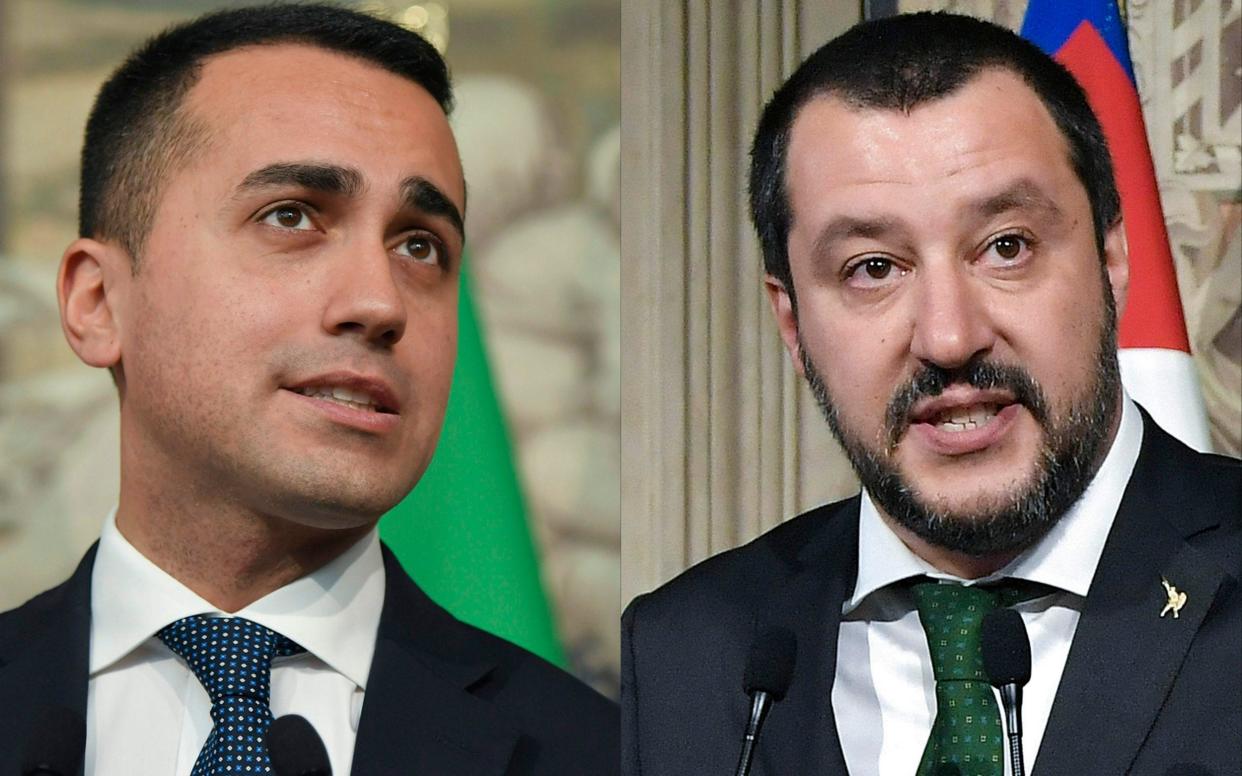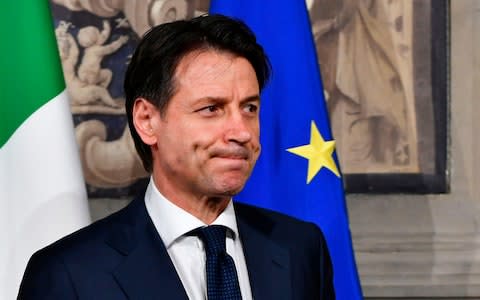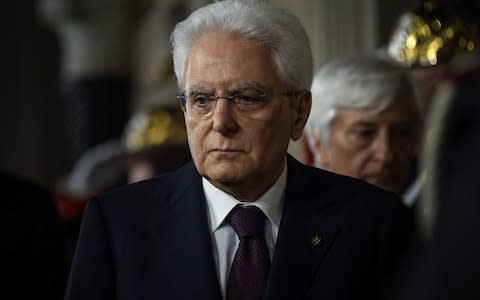Italy's populist parties reach new deal to form a government

Italy’s populist parties were finally given the green light to form a coalition government on Thursday evening, after they backed down over their initial selection of a deeply eurosceptic economy minister.
After days of intensive negotiations and pressure from the markets, the anti-immigrant, hard-Right League party and the anti-establishment Five Star Movement agreed to a compromise.
Both parties had come close to forming a government at the weekend, only for their efforts to be torpedoed by President Sergio Mattarella, who refused to approve their controversial choice of Paolo Savona as economy minister.
Paolo Savona, 81, has called Italy’s adoption of the euro a “historic error”, describing the single currency as “a German cage” and calling for a “plan B” that would allow the country to exit the eurozone.
“An accord has been reached for a Five Star-League government with Giuseppe Conte as prime minister,” the parties said in a joint note on Thursday night, after dropping their insistence on Mr Savona's position.

"Maybe finally we have made it, after so many obstacles, attacks, threats and lies," Matteo Salvini, the head of The League, wrote on Facebook shortly after the deal was announced.
Mr Conte, a university law professor with no political experience who was plucked from obscurity by the two parties to be prime minster, was summoned to the presidential palace in Rome on Thursday night, where he was given a mandate for the second time to form a government, expected to be sworn in on Friday.
Mr Savona is now likely to be given the consolation prize of European affairs minister. The economy portfolio could go to Giovanni Tria, a little-known economics professor.

Professor Tria has been critical of the EU's economic governance, but unlike Mr Savona he has not advocated a plan to prepare for Italy’s possible exit from the currency bloc.
Instead he has called for a change in the EU's fiscal rules to allow public investments to help growth and, like many mainstream economists, has criticised Germany's persistently large current account surplus.
Mr Salvini of The League is likely to become interior minister – enabling him to start implementing his campaign pledge to expel half a million unauthorised migrants from Italy.
He has called for repatriations to be dramatically stepped up.
A few hours before the agreement was announced, he set the possible tone of his ministry by tweeting a short video of a man who he claimed was a migrant plucking a pigeon on the side of a road.
“Final hours of work to form a government, we're putting everything into it. Meanwhile the news takes us back to harsh reality, with an immigrant plucking the feathers of pigeons in broad daylight and in the middle of the street...Go home!"
Could the eurozone be about to lose Italy?
Luigi Di Maio, the Five Star leader, could be made minister for industry and labour, a role in which he would push one of the party’s key campaign promises – to introduce a basic monthly minimum wage for Italy’s poor and unemployed.
The 88 days that it took to come to an agreement was described as “a Monty Python crisis” by one Italian newspaper.
“Only the celebrated English group of comedians could have come up with a saga like this,” La Stampa wrote on Thursday.
The two parties laid out extravagant spending promises during the election campaign, with The League pledging to introduce flat tax rates of 15% and 20% and Five Star attracting support with its plan to guarantee a minimum monthly wage of 780 euros.
The new government is likely to clash frequently with the EU, having already struck a deeply adversarial tone with Brussels apparatchiks.
About | Lega
The populist parties bridled this week when Guenther Oettinger, the EU’s Budget Commissioner, suggested that turmoil on the financial markets could teach Italians not to be seduced by populists.
Such turbulence “could be a possible signal to voters not to choose populists from Left and Right,” Mr Oettinger said.
Five Star were outraged by the remarks.
“The words of Commissioner Oettinger are absurd,” Mr Di Maio wrote on Twitter.
“These people treat Italy as though it is just a summer colony where they spend their holidays.”
But there was further provocation on Thursday from Jean-Claude Juncker, the President of the European Commission.
Asked about the economic situation in Italy, which has the second highest debt per capita in the EU after Greece, he said: “I’m in deep love with Italy. Bella Italia. But I can no longer accept that everything that is wrong in southern Italy is explained by the fact the EU, the European Commission won’t do enough.
“Italians have to take care of the poor regions of Italy. That means more work, less corruption, seriousness.
“We will help them as we always did. But don’t play this game of loading with responsibility the EU. A country is a country, a nation is a nation. Countries first, Europe second.”

